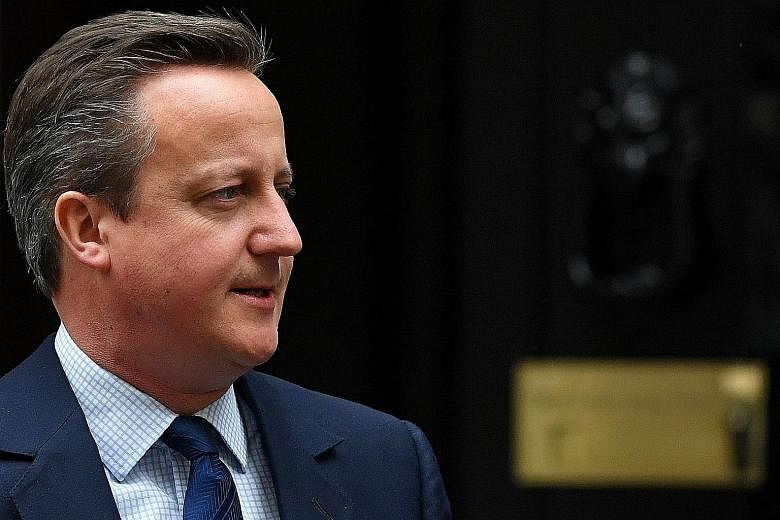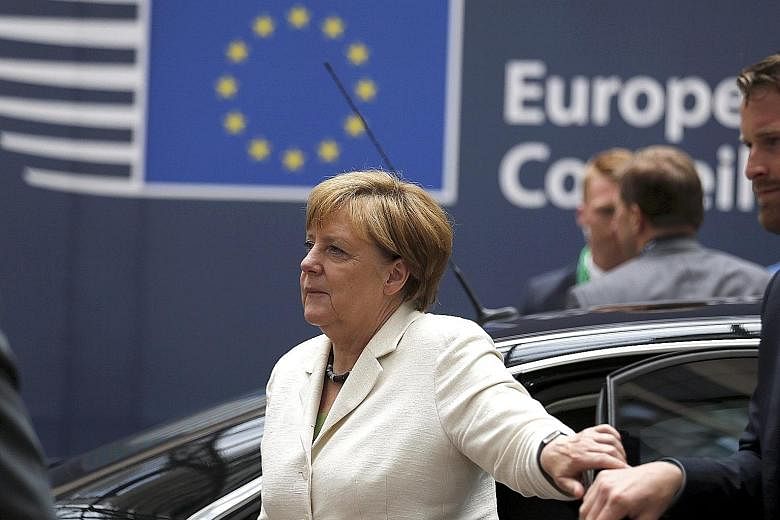BRUSSELS • European Union (EU) leaders yesterday agreed that Britain cannot have access to the single market after leaving it without accepting the bloc's rules on free movement, EU president Donald Tusk said.
"There will be no single market a la carte," he told a news conference in Brussels after the 27 leaders met without British Prime Minister David Cameron.
"Leaders made it crystal clear today that access to the single market requires acceptance of all four freedoms," he added. The four free- doms refer to the free movement of goods, services, capital and people.
Since last Thursday's Brexit vote, EU leaders have told Britain to leave quickly and German Chancellor Angela Merkel has warned London not to "cherry-pick" the terms of the exit negotiations.
The 27 EU leaders will hold a summit - without Britain - in Bratislava on Sept 16 to discuss further the fallout from Britain's decision to leave the bloc, Mr Tusk said. The summit will come just days after Britain's ruling Conservative party is due to choose on Sept 9 a successor to Mr Cameron, who resigned last Friday after his country voted in a referendum to leave the EU.
"This was a first exchange so it is too early to draw conclusions. This is why we started a political reflection with 27 states and we'll meet on Sept 16 in Bratislava to continue our talks," Mr Tusk said.
He also said that at the "calm and serious" discussion - the first EU talks in 40 years without a British leader present - the leaders agreed that it was a "serious moment in our common history".
"One issue is clear from our debate. Leaders are absolutely determined to remain united," he added.
Mr Tusk stressed that negotiations on Britain's future relationship with the EU cannot start until it formally triggers the two-year process leading to a divorce.
Mr Cameron has said this is a task for his successor.
Speaking in the British Parliament yesterday, he suggested that his successor could begin negotiations with the EU about Britain's exit before the formal "Article 50" legal process is triggered, despite comments from the EU to the contrary.
"They have said 'no negotiation, without notification' but I don't think that excludes discussion that a new prime minister can have with partners or indeed with the institutions so that we continue to get off on the right foot," he said.
As EU members worry about Britain dragging its feet about leaving the bloc, US Secretary of State John Kerry has joined a chorus of analysts wondering whether Brexit will actually happen.
Mr Kerry said Britain's vote to leave the EU might never be implemented and London is in no hurry to go. Speaking on Tuesday at an event in Aspen, he said Mr Cameron feels "powerless" to negotiate a departure he does not want.
"This is a very complicated divorce," he said.
Determined to make sure Scotland remains in the EU, Scottish First Minister Nicola Sturgeon was in Brussels yesterday on a short-notice visit to meet EU officials, including European Commission president Jean-Claude Juncker.
After meeting European Parliament president Martin Schulz, the pro-independence leader told reporters: "Scotland is determined to stay in the EU."
Meanwhile, the City of London faced the first direct threat to its role as Europe's dominant financial centre as French President Francois Hollande took aim at a key pillar of the UK industry.
"The City, which could handle clearing operations in euros thanks to the UK's presence in the EU, won't be able to do them any more," he said in Brussels.
Mr Hollande is the second French leader to target London's leading role in clearing euro-denominated transactions since Britons decided last week to leave the EU.
Mr Francois Villeroy de Galhau, governor of the Bank of Franc, said on Saturday that clearing cannot be located in London without following EU rules.
Said Mr Hollande: "As soon as Britain leaves the European Union's single market, if it decides to do so, there will be no reason for the euro zone to allow a non-member country to continue to carry out transactions in euro. I want European trading places to get ready to carry out these operations that eventually won't be done in the UK."
AGENCE FRANCE-PRESSE, BLOOMBERG, WASHINGTON POST
READ MORE ONLINE
More reports on Britain's EU referendum online at http://str.sg/brexit.


